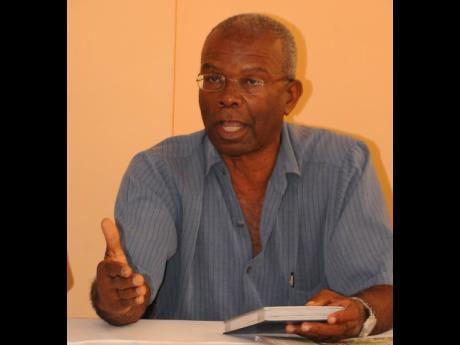Trelawny business shows concrete resilience
High interest rates will kill off businesses, and Delroy Christie knows this only too well because he has been a casualty of the unforgiving regime of the 1990s.
Christie is a serial businessman who is holding his own in sectors including construction and petroleum retail, while making a civic contribution as president of the Trelawny Chamber of Commerce.
His base is Trelawny Aggregates, the limestone rock-crushing plant that produces materials used in concrete, block-making, road foundations or for backfilling. Six- and eight-inch concrete blocks are a major output from the plant.
This company is a testament to the business resilience of Christie and his partner, Carvel Stewart, of football administration fame, for successfully riding out the financial storm of the 1990s and surviving the battering to the construction sector.
The decade of the ’90s was a period of financial instability triggered by stratospherically high interest rates, causing the bad-debt portfolios of banks to balloon, and insurance companies were rendered insolvent, prompting the Government to form the much-despised bailout vehicle known as the Financial Sector Adjustment Company (FINSAC), which spelt the death knell for many struggling businesses.
“A lot of people were destroyed by this FINSAC thing and Government keep saying, it’s because people borrowed money irresponsibly. That is only half of the story,” he argues, recalling that desperate measures, including suicide, were taken by some persons whose businesses were taken over and sold to cover debts.
What was Christie’s experience?
Graduating from the University of the West Indies in 1968 as a civil engineer, he worked with various companies before venturing on his own to start Cedar Construction in 1976.
A subsequent merger with like-minded persons created CFC Construction, which was based in Kingston but did work all over the country. Among the major landmarks built by the company were the Braco Village hotel, renamed Melia; the former Hedonism 3 hotel in Runaway Bay, now called Jewel and operated by the Playa chain; and the former Crowne Eagle hotel in Manor Park, St Andrew. All three properties were taken over by FINSAC and later sold, even as Christie contends they owed millions of dollars to his construction company.
Reflecting on that episode, he lamented: “That destroyed the Jamaican middle class. People like me will never borrow money again. It was a crazy period in our history.”
Painful experience
The painful experience of having the assets of his construction company seized and sold off by the state agency has had a lasting effect. “They didn’t even attempt to collect the debt that was owed to us,” he complained.
While building the Braco hotel in 1994, CFC bought quarry land that was rich in limestone. Its location was just across the road from the construction site and provided building materials literally a stone’s throw away. The quarry, which was itself the subject of a failed takeover bid by FINSAC, has operated since then as Trelawny Aggregates, building up a steady clientele in Trelawny, neighbouring St Ann and St James, but also extending to Hanover, Westmoreland and Kingston.
This is despite the setback of not being able to cash in on an initial plan to supply aggregates for the construction of the North Coast Highway, which was built in the 1990s. Christie notes that the foreign contractors for the road project opened a quarry a mile apart to supply materials.
Trelawny Aggregates provides employment for more than 40 people. Unregistered block-making operations that fall short of Bureau of Standards’ requirements nonetheless provide competition for Trelawny Aggregates.
The good thing is that Trelawny is experiencing a building boom, with several housing developments having sprung up on the outskirts of Falmouth in recent years, as well as various ongoing home-expansion projects.
Still maintaining what he says is a small stake in another construction company, Crossings Construction, Christie is peeved that the onerous requirements exclude the company from prequalifying to bid for big government construction projects, despite the principals having undertaken some major construction work across the country either as engineers or building contractors. He named the Kingston trans-shipment port and the Ocho Rios and Port Antonio cruise ship piers among them.
The Trelawny businessman is also an investor, along with Dennis Seivwright and Archibald Williams, in a Fesco-branded petrol station that operates in the town of Duncans, Trelawny. Having run that venture for about six years, Christie says it is a business with small margins.
He joked that he and his partners were brave to take on a business that was shuttered by Texaco. “For us, the potential seems to be there and the town is growing,” he noted.
Undaunted by the challenges, the Trelawny Chamber of Commerce president says he is always on the lookout for business opportunities but is concerned that successive Jamaican governments have not been adequately encouraging the emergence, survival and growth of businesses. “We need more business people in government,” he said.

